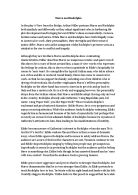Miller displays Marco in A View from the Bridge as a person who fulfills the stereotype of masculinity, who is is described as a ‘square-built peasant’ who could ‘load the whole boat by himself’. In addition, his physical dominance is asserted over Eddie when he is said to ‘hold the chair like a weapon over his head’, which is the first sign in the play of Marco proving his physical capabilities. Marco chooses not to utilise or assert his strength most of the time, however, and he is described as ‘tender and quiet-voiced’. This is a juxtaposition to the previous statements made about his physical appearance, and showcases the fact that Marco does slightly differ to the masculine stereotype. Whereas Eddie’s whole personality and role is based upon his control and and masculine dominance over the household, Marco manages to be more dominant, yet also have an apparent caring and kind side. However, Marco’s relationship with Eddie changes throughout the play. At the beginning, Marco is fine with being under Eddie, and ‘settles’ for being his subsidiary. However, when Eddie attempts to intimidate Rodolpho, Marco asserts his dominance over Eddie, by holding the chair ‘over his head’. Again, here, he ‘settles for half’ in the way that he takes the issue no further. At the end of the play however, Marco settles for nothing but killing Eddie. Miller uses the fact that Eddie's obsession with control and power is his fatal flaw that ultimately leads to his death, and the fact that Marco’s unrestricted release of his physical dominance most likely leads to his incarceration to portray the need to ‘settle for half’ and to only assert dominance when required, rather than it be the foundation of your personality.
One thing that does essentially emasculate Marco however is when he is unable to provide for his family, as can be seen when he ‘shrugs shyly’ when asked what work he used to do. Throughout the play, Marco is portrayed as a very familial figure, and in fact, as soon as he is introduced in the play, the wellbeing of his family is the primary focus. His main reason for working in America is the fact that his ‘older one is sick in the chest’ and he wants to work to send money back home. He possesses a sheer desperation to provide for his family as can be seen by the fact that he moved all the way to America just for work and the fact that he says ‘what can I do’ when asked about his children, and the fact that he does ‘whatever’ work he can. Throughout the play, in fact, he looks out for Rodolpho as his brother. For example, when he notices that something is wrong in the relationship between Eddie and Rodolpho, he looks out for Rodolpho, by saying how ‘everyone gets fat when Rodolpho cooks’ and he even tells Rodolpho to ‘come home early now’ when Eddie complained. Marco even takes it to a more extreme level when Eddie attempts to intimidate Rodolpho by challenging him to the boxing match, and he essentially acts as protection for Rodolpho by ‘holding the chair’ to assert his dominance over Eddie. He does this not for personal gain or satisfaction, but instead to look out for his brother. When Marco is caught by immigration, his focus does not shift. He claims that Eddie ‘killed his children’, showing the fact that his priority is still his family, even though he is being convicted. However, although family was important to him, his priority changes to upholding morals when he decides to go and kill Eddie. This almost decides Marco’s own fate, and deprives him of any more weeks he may have had on bail to further provide for his family. In this way, Miller showcases the need for familial responsibility, and how this should be a priority, as it is when Marco behaves like this that he is a sympathetic character for the audience. However, Miller also stresses the need for family to always be the priority, and the need to settle for half between family and morality, through Marco’s downfall.
Overall, Marco is portrayed as a character whose personality and priorities change throughout the play. Generally, he is a responsible, caring, family minded character, who also is capable of asserting dominance when required. However, he is also the character who brings about the end of the play and his own demise, mainly due to his strong belief in Italian morals and his subsequent failure to ‘settle for half’.








